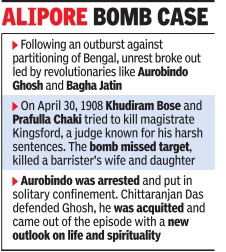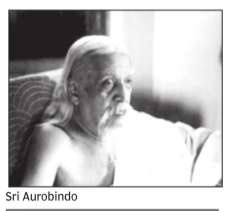Sri Aurobindo Ghosh

This is a collection of articles archived for the excellence of their content. |
A profile
Apr 25 2015
Bengal minister's Aurobindo play sitting on a time bomb
Priyanka Dasgupta
Did Rishi Aurobindo `run away' from the freedom movement? Or was he disillusioned by the ways of freedom fighters? This is one controversial question a Bengali play written and directed by state tourism minister and playwright Bratya Basu raises. The play, Boma -supposedly a work of fiction -is based on the Alipore bomb case and the year-long trial that followed. It takes off from April 30, 1908, when Khudiram Bose and Prafulla Chaki tried to kill magistrate Kingsford. The bomb missed the target and killed the wife and daughter of barrister Pringle Kennedy .
`Boma' -to be staged next Monday -heightens the visual experience using a simulated drizzle on stage. It also uses animation on a backdrop as lawyer Chittaranjan Das argues Aurobindo's defence saying: “I say that the man in his position isn't only standing before the bar of this court, but before the bar of the high court of history .“ Basu says he'd like to play Das's role in some shows.
Controversy begins after Judge Beachcroft announces the verdict.Aurobindo is among the 17 acquitted.Subtle hints are dropped at how the judge had a soft corner for Aurobindo since they were batchmates during civil services training. Bratya, who anchored path-breaking Bengali plays like `Ruddhasangeet' and `Winkle Twinkle', isn't scared of controversy .
He writes highly-loaded fictional dialogues for revolutionary Hemchandra Kanungo's character. Standing behind prison bars, Hemchandra bursts out in anger: “You (Aurobindo) have saved yourself but history won't forgive you.“ In another scene, Aurobindo's brother Barin says: “Why did I tell my brother survival lies only in mixing religion with politics? Little did I know he'd give up politics and take refuge in religion.“
Wasn't Basu scared to write such provocative lines? “These issues are frequently brought up in Aurobindo's context. In his lifetime Aurobindo never answered critics. I've tried to answer them and written dialogues for Aurobindo. I don't believe Aurobindo was an escapist. The play deals with the relationship between religion and politics -something haunting us today as well,“ he says.
Historian Rajat Kanta Ray says he has discussed Aurobindo's departure to Puducherry in his thesis. Asked if Aurobindo's `running away' from the freedom movement remains a topic of debate, Ray says: “I'd written that Aurobindo had taken off for Pondicherry to contemplate for the rest of his days `The Life Divine'. This was youthful writing and I've since rethought the matter. It's a fact that Aurobindo didn't engage in politics after his departure to Pondicherry .“
Ray says he's moved on and this subject doesn't interest him much.
Basu's fictional character, Kalpana, adds a twist to the narrative. In a fiery speech, she tears apart the image of holier-than-thou revolutionaries and talks about how infighting over trivial issues derailed the freedom struggle. In one scene, Basu refers to Barin alleging a relationship with a lady becoming an issue between revolutionaries Satyen Bose and Jatindranath Bandopadhyay . Ray says: “I came across files in the IB archives and the home political series where secret police alleged sexual intrigues.This is a matter for serious thinking.“ Peter Heehs, author of `The Bomb in Bengal' and `The Lives of Sri Aurobindo', says, “Even if I disagreed with him (Basu), I'd welcome an intelligent debate. As a historian who's researched Aurobindo's participation in the freedom movement, I'd be in a position to offer fact-based criticisms of the writer's interpretation.“ Having had his share of experiences in India for his books, does Heehs think Indian playwrights should focus on such sensitive issues? “If the issues are sensitive they should be examined with diligence and respect for the person under study,“ he says.
Debshankar Halder, who plays Aurobindo, says he consented to the role because it's important to have such dialogues. “People are free to reject them. But since the play resonates with emotional truth, Kolkata's audience will watch it.“
Matri Prasad, a Sri Aurobindo Ashram inmate in Puducherry , isn't closed to the idea of the play. “Everyone should be free to approach the truth in his own way . Why doubt the efforts of a playwright? I understand Bengali, but won't go the extra mile to watch it.“
